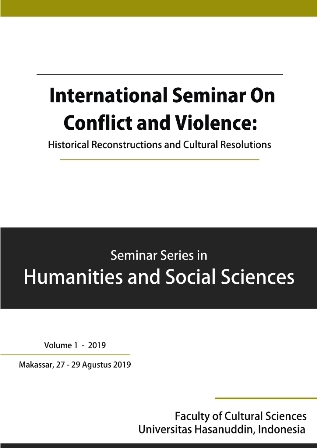KESEJAHTERAAN PSIKOLOGIS EX NARAPIDANA TERORIS (STUDI KASUS PEMUDA MANTAN TERORIS KABUPATEN POSO)
Abstract
The inability to touch the psychological aspects of ex-convict terrorists is the beginning of the failure of the deradicillation program. Previous research shows that aspects of psychological well-being are very influential on a person's attitude and mindset. The higher a person's psychological well-being, the more open insight and ability to actualize themselves in society. Ryff (1995) formulates that psychological well-being includes selfacceptance, positive relationships with others, independence, environmental mastery, life goals, and personal growth. This study discusses the psychological well-being of terrorist ex-prisoners in Poso District and how are they able to deal with the negative stigma of the general public? To answer these academic problems, researchers used qualitative research with the life story approach. Data was collected through direct observation and interviews with ex inmates and analyzed using thematic methods. The results of this study contribute significantly to the success of national deradicalisation programs through fostering ex-terrorist prisoners based on mapping their aspects of psychological well-being. In addition, this research will also help strategic programs that lead to strengthening the independence of ex-terrorist prisoners in actualizing themselves in society.References
Ali Fauzi. (2019, 27 Juni). [Online]. Available: https://crcs.ugm.ac.id/wednesday-forumreport/12485/the-disengagement-of-jihadists-in-poso.html diakses pada hari 27 Juni 2019.
Ardilla Ike Herdiana, & Fauziya Ardilla. (2013). Penerimaan Diri pada Narapidana Wanita. Jurnal Psikologi Kepribadian Dan Sosial.
Boyatzis, R. E. (1998). Transforming qualitative information: Thematic analysis and code development. In Sage Publications.
Cohen, S. (1985). Stress, social support and the buffering hypotheses. Psychological Bulletin, 98 (2), 310-357.
Cutrona C., E & Gardner, (2004). Type of social support and specific stress: Toward a theory of optimal matching. New York: Wiler
Cooke, D., Baldwin, P., & Howison, J. (1993). Psychology in prions. London: Routledge.
Cohen, S. (1985). Stress, social support and the buffering hypotheses. Psychological Bulletin, 98 (2), 310-357.
John, H., & Braddock, K. (2010). Rehabilitating the terrorists?: Challenges in assessing the effectiveness of de-radicalization programs. Terrorism and Political Violence, 22 (2), 267–291. https://doi.org/10.1080/09546551003594748.
Kartika, D. (1996). Dkungan sosial dan perilaku terhadap oranglain, Jurnal psikologi, 23, 112.
Li, L., & Moore, D. (1998). Acceptance of disability and its correlates. Journal of Social Psychology. https://doi.org/10.1080/00224549809600349.
Levenson, J. S., & Cotter, L. P. (2005). The effect of Megan’s Law on sex offender reintegration. Journal of Contemporary Criminal Justice, 21(1), 49-66 .
Levenson, J. S. (2003). Community notification and civil commitment of sex offenders: A review of policies desig.
Mareta, J. (2018). Rehabilitasi Dalam Upaya Deradikalisasi Narapidana Terorisme. Masalah-Masalah Hukum, 47(4), 338. https://doi.org/10.14710/mmh.47.4.2018.338 -356.
Milla, M. N. (2012). Disengagement dan Reintegrasi eks Narapidana Teroris di Masyarakat. 1– 16.
Mulcahy, E., Merrington, S., & Bell, P. J. (2013). The Radicalisation of Prison Inmates: A Review of the Literature on Recruitment, Religion and Prisoner Vulnerability. Journal of Human Security, 9(1), 4–14. https://doi.org/10.12924/ johs2013.09010004.
Poerwandari, E. K. (2007). Pendekatan Kualitatif: Penelitian Perilaku Manusia. Depok: Lembaga Pengembangan Sarana Pengukuran Dan Pendidikan Psikologi (LPSP3), Fakultas Psikologi UI.
R F Baumeister, J D Campbell, J I Krueger, & K D Vohs. (2003). Does High Self-Esteem Cause Better Performance, Interpersonal Success, Happiness, or Healthier Lifestyles? Psychological Science in the Public Interest. https://doi.org/10.1111/15291006.01431
Ryff, C. D. (2005). Happiness is everything, or is it? Explorations on the meaning of psychological well-being. Journal of Personality and Social Psychology. https:// doi.org/10.1037/0022-3514.57.6.1069
Ryff, C. D., & Keyes, C. L. M. (1995). The Structure of Psychological Well-Being Revisited. Journal of Personality and Social Psychology. https://doi.org/10.1037/00223514.69.4.719
Sa’diyah, S. (2016). Gambaran Psychological Well-Being dan Stres Pengasuhan Ibu dengan Anak Autis. SEMINAR ASEAN 2nd PSYCHOLOGY & HUMANITY.
Santoso, M. B., Krisnani, H., & Isna Deraputri, G. N. (2018). Gangguan Kepribadian Antisosial Pada Narapidana. Share : Social Work Journal, 7(2), 18. https:// doi.org/10.24198/share.v7i2.15681
Silke, A., & Veldhuis, T. (2017). Countering Violent Extremism in Prisons : A Review of Key Recent Research and Critical Research Gaps. Perspectives on Terrorism, 11(5), 2–11.
Sukabdi, Z. A. (2018). Psychological rehabilitation for ideology-based terrorism offenders. Deradicalisation and Terrorist Rehabilitation, 4(1), 95–116. https:// doi.org/10.4324/9780429469534-7
Sari, R., S., (2014). Hubungan dukungan sosial dengan psychological well-being pada narapidana remaja. Jurnal kepribadian dan sosial, 3 (3): 143 – 148
Utami Noviana Made Ni. (2013). Hubungan Antara Dukungan Sosial Keluarga dengan Penerimaan Diri Individu yang Mengalami Asma Ni Made Sintya Noviana Utami. JJurnal Psikologi Udayana.
Uchino, B. (2006). Social support and health: A review of physiological processes potentially underlying links to disease outcomes. Journal of Behavioural Medicine, 29: 377–387
Vogel, D.L, N.G. Wade & S. Haake, (2006). Measuring the self stigma associated with seeking psychological help. J. Counsel. Psychology., (53) 325-337.
Winefield, H. R., Gill, T. K., Taylor, A. W & Pilkington, R. M. (2012). Psychological well-being and psyhological distress: Is It Necessary To Measure Both? Psychology Of Well-Being: Theory, Research And Practice, 2:3

